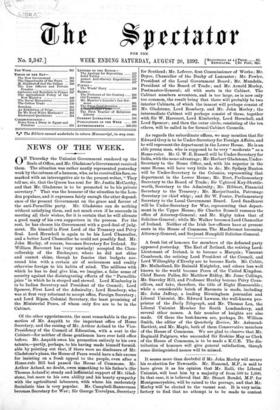Of the other appointments, the most remarkable is the pro-
motion of Mr. Asquith to the important office of Home Secretary, and the raising of Mr. Arthur Acland to the Vice- Presidency of the Council of Education, with a seat in the Cabinet—for neither of these gentlemen have ever held office before. Mr. Asquith owes his promotion entirely to his own talents,—partly, perhaps, to his having made himself formid- able by pointing out that, if there were no disclosure of Mr. Gladstone's plans, the House of Peers would have a fair excuse for insisting on a fresh appeal to the people, even after a Home-rule Bill had passed the House of Commons. Mr. Arthur Acland, no doubt, owes something to his father's (Sir Thomas Acland's) steady and influential support of Mr. Glad- stone, but more to his own ability and his hearty sympathy with the agricultural labourers, with whom his moderately Socialistic bias is very popular. Mr. Campbell-Bannerman becomes Secretary for War ; Sir George Trevelyan, Secretary for Scotland; Mr. Lefevre, first Commissioner of Works ; Mr. Bryce, Chancellor of the Duchy of Lancaster; Mr. Fowler, President of the Local Government Board ; Mr. Mandela, President of the Board of Trade ; and Mr. Arnold Morley, Postmaster-General ; all with seats in the Cabinet. The Cabinet numbers seventeen, and is too large, as is now only too common, the result being that there will probably be two interior Cabinets, of which the inmost will perhaps consist of Mr. Gladstone, Lord Rosebery, and Mr. John Morley ; the intermediate Cabinet will perhaps consist of these, together with Sir W. Harcourt, Lord Kimberley, Lord Herschel, and Lord Spencer; and then the outer circle, consisting of the ten others, will be called in for formal Cabinet Councils.


































